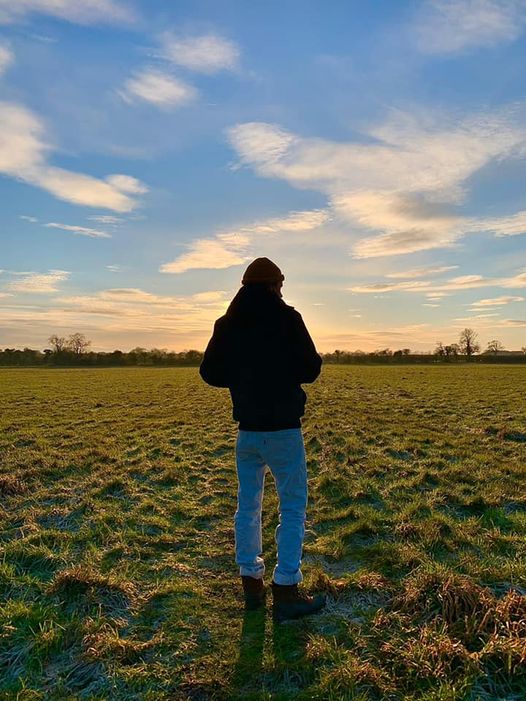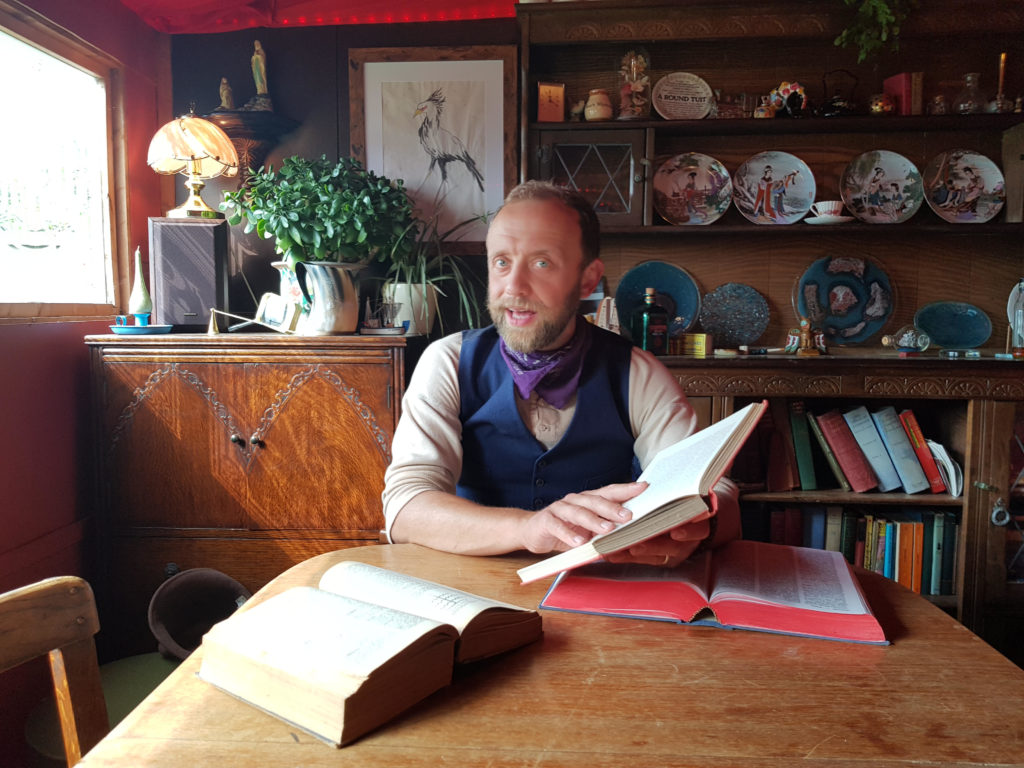
Alexander Wright, Remarkable Acts Of Narcissism; Michael Lambourne, Black Shuck: How It Came For Me, Theatre At The Mill, Stillington
THEY take the trouble at The Mill to be innovative.
From deciding no-one was for tennis on a pot-holed court to building an outdoor theatre in its stead; from unicorn ice cream to fairy-lit gardens; from Saturday morning pop-up cafés to supper club nights; from the green shoots of SeedBed try-outs for emerging talent to works in full bloom by Alexander Wright, Phil Grainger, York theatre-makers Anna Soden (Strawberry Lion Theatre) and Gemma Curry (Hoglets Theatre) and music events with Jessa Liversidge and Gary Stewart.
The Wright stuff, getting it right, as parents Paul and Maggi and son and daughter Alex and Abbigail oversee an arts enterprise with community at its heart. Make that two communities, those who live around there and those who work in the arts. Food, soul food and food for thought at the former corn mill.
Your reviewer has long championed the theatre work of both Alexander Wright and Michael Lambourne, sometimes in tandem (The Tempest and The Great Gatsby) or in their own projects. Summer At The Mill has brought an opportunity to see them both in a new light: Alex giving his debut solo performance (with guests) and Michael hatching his storytelling debut.
Alex is a writer, director, actor, musician, visionary, facilitator but… “I’ve never really stood in front of people and performed my own stuff, on my own, for an extended period. So, now, I am…and I’m nervous about it,” he said beforehand, natty for the night in suit, trainers and trilby.
In his hand was a brown envelope, as Alex’s eyes invited immediate interaction. Yours truly took it, and no, checking the content, it wasn’t a bribe. Inside was a poem, Narcissus. Alex had found his first guest to read aloud, and so the informality and unpredictability of Remarkable Acts Of Narcissism had begun, the one certainty being that Alex’s words would not be on his lips alone.
He was in salesman’s mode too. Not snake oil, but those alchemical Wright words bound in a slim volume, Remarkable Acts Of Narcissism: a collection of poems and stories “put together for a gig I decided to do of my own writing in a theatre I built in my own garden”, with a title coined by Eurydice actor-musician Casey Jay Andrews.
“I’d like to be clear that no-one asked me to print this book, but it is cheaper to print £100’s worth and I have been unemployed for 18 months,” he said.
Unemployed? Building a theatre, writing, presenting and performing shows, more writing, organising Summer At The Mill, more writing. You know what they say, if you need something doing, always ask someone who’s busy.
So busy, in fact, that Alex had memorised only one piece, from his play The Gods The Gods The Gods; the rest of the two sets he would perform with book in hand: an excellent way to advertise its availability. Oh, did Alex tell you, he has a book for sale? Just checking.
Pink stickers marked the poems, short, very short and much longer, that Alex had picked out for the night, three written to his partner, Megan, to close the chasm of her being on the other side of the world in Australia.
“Stop taking notes, Charles,” he pleaded, but the memorable imagery kept coming: “Kissing snowflakes off each other”; “hand-me-down days, secondhand nights”.
Alex is wont to deflect attention from himself, often happy to play the ringmaster with acts to parade. “I’m not that interested in poetry nights, if I’m honest”, he said, as he invited singer-songwriter Tom Figgins to reveal the fruits of the dormant songwriting gift he had resumed in lockdown for the first time since 2017. Beautiful, Tom, beautiful. He had arrived at 6.30pm, and already Alex had asked him to do the sound. That’s how these At The Mill shows work: off the cuff; heart on the sleeve; go with the flow. Just say ‘Yes’.
Abbigail, marketeer, baker, mother, puppet maker, pop-up café queen, had her party-piece cameo moment too, splitting an apple clean in two by applying just the right pressure. Pip pip.
“Logic and probability would suggest that someone here can play piano,” chanced Alex, knowing full well that childhood friend Jim Harbourne would oblige, already on site at the Mill for a week’s rehearsals to reactivate Beulah with fellow musician and composer Ed Wrenn for the first time in six years.
Alex went on to play drums, piano and guitar himself, but all the while, the words were to the fore, some from 2010/2011, “but most things are new – and I don’t mean that philosophically,” he said.
The interval brought a chance, you guessed it, to buy the book at the bar before a second half where Alex removed jacket and hat and informality reigned again. “**** knows why you get married in English and divorced in Latin,” he observed wryly.
His old school drama teacher joined him on stage; Harbourne and Wren reawakened two wonders from Beulah, Coffee In The Morning and Humans Fly; Abbigail was called on for another solo, this time vaulting a gate at the field’s edge, and no show would be complete without the Phil Grainger & Alex Wright double act.
On this occasion, Alex had written a poem for Megan, Phil, a song for his Aussie girlfriend Angie, and now they became one as Home, with Phil having learnt his closing guitar part on holiday in Cornwall. Alex sat cross-legged for the first time since primary school; crossed fingers might have been more apt, but they never freeze at a challenge, and one of the high points ensued, Damien Rice song references and all.
This night might never be repeated, but that’s the point. Words age on the page but they have their stage, their moment, as they come alive in unpredictable fashion when performed by Wright, his guest performers or audience volunteers. Writing can be solitary, lonely, but Wright writes to communicate with others for their joy, their sharing; their response in the moment. Narcissistic? Absolutely not! Plugging the book again one more time? Of course.

Wright had talked of pre-show nerves ahead of Remarkable Acts Of Narcissism. Michael Lambourne, on the other hand, radiates supreme confidence on stage, with a voice to set off earthquakes and the presence to draw you to him like a magnet.
He once played Prospero among the trees at Stillington Mill, but would joke in his York theatre days of his propensity to be cast in anthropomorphic roles. Animal magic, as it would always turn out.
Taking up Alex’s “call to arms” to test-drive a new piece at Theatre At The Mill, Michael headed north from the Cambridgeshire Fens with the ink barely dry on a ghost story based on the legend of the Demon Dog of East Anglia: a hound of unnatural size and omen of misfortune to those who encounter its stare.
And yes, he did play the hell hound, or rather he elicited its terrifying growl terrifically terrifyingly, because Michael was in “responsive storytelling experience” mode: a new venture for him and one that surely will be repeated.
He has lit the fire beneath the words of many others; likewise, others have performed his words, but for the first time, here he was giving breath to his own writing, to the manner born, in Black Shuck: How It Came For Me.
Like Alex’s show, Michael began with an air of informality, after a delightful set of transformative Scottish myths of travellers, selkies and winter and summer queens by former York Theatre Royal creative associate Shona Cowie.
In waistcoat and trilby, he explained why he wore his grandfather’s watch, despite it telling the correct time only twice a day, and how he had re-discovered his book of The World Of The Unknown Ghosts, with its scary picture of one-eyed black dog.
That image accompanied the tale of Black Shuck, “a story about the place I’m from”, one that Lowestoft lads The Darkness had highlighted on their debut album with the chorus “Black Shuck, Black Shuck, That dog don’t give a…”. You can fill in the rest.
“To be honest, I hope you don’t enjoy it,” said Michael, pulling the strings of an already rapt audience. He can rhyme with Ian Dury rhythm, spin a yarn with silken imagery, born of the “pancake-flat fields of the Fens”, and he is not averse to a political jibe. “Just like a lie on the side of a bus,” he observed.
Michael has never looked Black Shuck in the red eye, but his choice of Fenland folk tale and its portent of exit stage left or imminent change chimed with his own fate: his diagnosis at 40 with lymphoma, the blood cancer.
“My disease was a game but I couldn’t choose if I’d win or I’d lose…when Black Shuck found me,” he said at the finale. He is now in remission, back on stage, opening a new chapter rather than nearing The End. Long may Michael tell stories and have stories to tell in the voice with boom, not the voice of doom.
